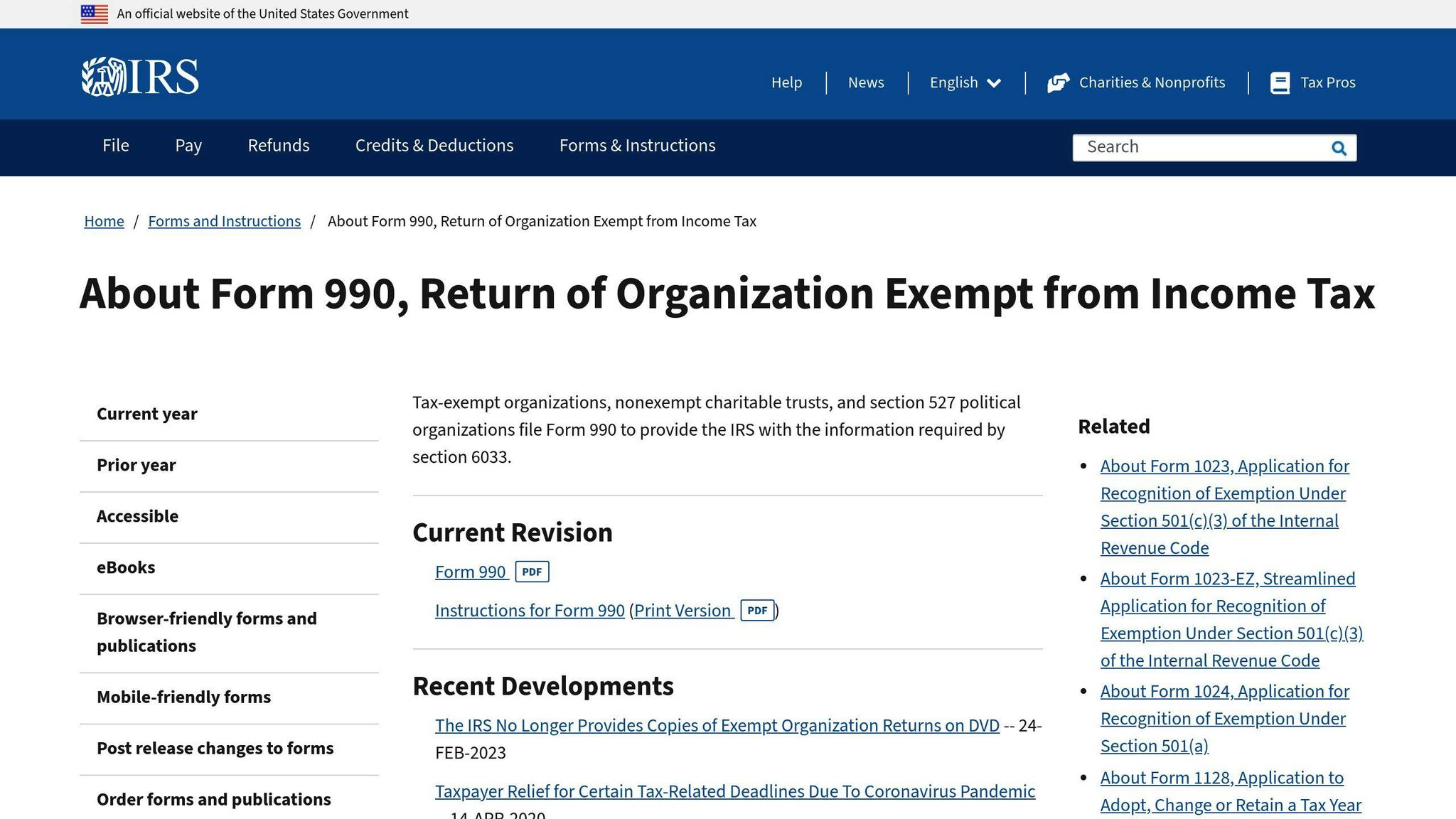Common Tax Mistakes Nonprofits Make (And How to Avoid Them
Learn about common tax mistakes nonprofits make and how to avoid them to protect your tax-exempt status and maintain donor trust.

Nonprofits often face serious consequences from tax mistakes, like losing tax-exempt status, fines, or eroding donor trust. Here’s how to avoid the most common errors:
- File Form 990 on Time: Missing this for three years leads to automatic loss of tax-exempt status.
- Classify Workers Correctly: Misclassifying employees as contractors can result in back taxes and penalties.
- Handle Payroll Taxes Properly: Nonprofits must withhold and pay Social Security, Medicare, and income taxes.
- Report Unrelated Business Income (UBI): Income from non-mission activities (e.g., advertising or unrelated sales) must be reported and taxed.
- Keep Donation Records Accurate: Maintain detailed records of cash, in-kind, and non-cash gifts to build donor trust and ensure compliance.
Quick Tips to Stay Compliant:
- Use accounting software to track finances.
- Work with tax professionals for guidance.
- Keep organized records of all financial activities.
Which Form 990 Do I File?

Common Tax Errors Nonprofits Should Avoid
Handling tax compliance can be tricky for nonprofits, but knowing where others often go wrong can help you steer clear of penalties and protect your tax-exempt status.
Not Filing Form 990 on Time
Submitting Form 990 is crucial for staying compliant and keeping your tax-exempt status. Missing this deadline, especially for three years in a row, results in an automatic loss of tax-exempt status.
The IRS uses Form 990 to assess nonprofit operations and detect potential fraud. It also promotes transparency, offering donors and stakeholders a clear view of the organization's financial activities.
Misclassifying Workers as Employees or Contractors
Getting worker classifications wrong can lead to fines, back taxes, and legal problems. Use the table below to understand the differences:
| Employee Characteristics | Contractor Characteristics |
|---|---|
| Organization controls schedule | Sets own schedule |
| Works under direct supervision | Works independently |
| Uses organization's equipment | Uses own equipment |
| Receives regular wages | Paid per project/contract |
| Eligible for benefits | No benefits provided |
Ignoring Payroll Tax Responsibilities
Payroll taxes aren’t just for businesses - they’re equally important for nonprofits. Your responsibilities include:
- Withholding Social Security, Medicare, and income taxes
- Paying the employer portion of Social Security and Medicare
Failure to handle these correctly can trigger the Trust Fund Recovery Penalty (TFRP), putting both the organization and its leadership at financial risk.
Failing to Report Unrelated Business Income (UBI)
Nonprofits often overlook taxable unrelated business income. The IRS defines UBI as income from activities that don’t directly relate to the organization’s exempt purpose. Mixing personal and organizational funds can make UBI reporting even more complicated, increasing compliance risks.
Examples of UBI include:
- Advertising revenue
- Sales of unrelated merchandise
- Income from third-party rentals
Errors in Donation Reporting
Accurate donation reporting is about more than compliance - it builds donor trust, which is key to long-term success. Keep detailed records of cash, in-kind donations, non-cash gifts, and donated services to ensure both compliance and donor confidence.
Knowing these common mistakes is just the start. Up next, we’ll dive into practical steps to avoid them.
Steps to Prevent Tax Mistakes
Avoiding tax mistakes requires more than just awareness - here’s how you can stay ahead.
Keep Financial Records Organized
Maintain clear records for donations, expenses, payroll, and grants. Essential documents include donor receipts, invoices, bank statements, and payroll agreements. Here's a quick reference:
| Category | Key Documentation |
|---|---|
| Donations | Donor acknowledgments, gift receipts |
| Expenses | Receipts, invoices, bank statements |
| Payroll | Tax withholding forms, contractor agreements |
| Grants | Award letters, spending reports |
Consider using cloud storage for secure and easy access to your records. Regularly reconcile these records - monthly checks can help you spot and fix discrepancies before they become tax problems.
Work with Tax Professionals
Partnering with tax professionals can save you from costly mistakes. They can assist with:
- Ensuring Form 990 submissions are accurate
- Reviewing potential unrelated business income
- Confirming worker classifications are correct
- Navigating state and local tax requirements
Their expertise can help you stay compliant and avoid penalties.
Use Technology to Stay Compliant
Leverage financial tools to minimize tax errors. Software like QuickBooks Nonprofit makes it easier to track donations, ensure compliance, and generate accurate financial reports. Keep your tools updated and train your team regularly to maximize their effectiveness.
Examples of Nonprofit Tax Challenges and Solutions
Understanding how nonprofits have tackled tax issues can offer practical insights for others facing similar challenges.
In 2023, the Community Arts Center of Springfield ran into trouble after misclassifying part-time instructors as contractors rather than employees. Following an IRS audit, they corrected the classification, fixed payroll tax errors, filed amended returns, and introduced a payroll system to prevent future mistakes.
The Youth Education Foundation faced issues when it failed to report $75,000 in unrelated business income (UBI) from its gift shop and café. To address this, they brought in a tax professional, started using QuickBooks to monitor UBI, and implemented a digital receipt system for better accuracy and compliance.
| Challenge | Solution | Result |
|---|---|---|
| Unreported UBI | Hired tax professional | Identified taxable income |
| Lack of UBI tracking | Implemented QuickBooks | Accurate reporting |
| Missing documentation | Digital receipt system | Complete records |
In 2024, the Helping Hands Food Bank successfully defended its tax-exempt status during an audit. They achieved this by keeping detailed digital records of donations, volunteer activities, program expenses, and grant usage. Their record-keeping system became a model for other nonprofits aiming to stay compliant.
These examples highlight how taking proactive steps can help nonprofits avoid serious tax issues and maintain compliance.
Conclusion: Protect Your Nonprofit's Tax-Exempt Status
Failing to comply with tax regulations can lead to serious problems, including fines and losing your tax-exempt status. With the IRS paying closer attention, nonprofits must stay organized and follow filing rules carefully to avoid these issues.
To protect your nonprofit's tax-exempt status, prioritize these key actions:
- Perform regular internal audits to identify and resolve issues early
- Work with tax experts who specialize in nonprofits
- Use accounting software tailored for nonprofit needs
- Keep detailed records of all financial activities
Certain areas, like timely Form 990 filing, accurate payroll tax management, and proper reporting of unrelated business income (UBI), are especially important. Tools like automated reminders, payroll software, and professional advice can help you manage these effectively.
| Risk Area | Prevention Strategy |
|---|---|
| Form 990 Filing | Use automated reminders, file early |
| Payroll Taxes | Use payroll software, conduct regular audits |
| Unrelated Business Income | Track UBI separately, seek expert advice |
Examples of nonprofits addressing tax challenges early show how proactive measures can help maintain compliance. Staying updated on regulatory changes and refining your processes as needed is crucial. Collaborating with knowledgeable tax professionals and using modern tools can help ensure your nonprofit remains compliant.
Maintaining tax-exempt status isn’t just about avoiding penalties. It’s about ensuring your organization can continue its mission and retain the trust of your donors. By putting strong financial controls in place and staying vigilant about compliance, your nonprofit can stay focused on what truly matters: serving your community and advancing your cause.
FAQs
Is sponsorship to a nonprofit tax deductible?
Corporate sponsorships to nonprofits can qualify as tax-deductible if they meet specific IRS guidelines. It's important to differentiate between qualified sponsorship payments and advertising, as this determines the tax treatment.
| Sponsorship Type | Tax Treatment | Key Details |
|---|---|---|
| Qualified Sponsorship | Tax-deductible | Simple acknowledgment without promotional content |
| Advertising/Marketing | Not tax-deductible | Includes promotions, pricing, or endorsements |
For example, a $10,000 sponsorship is tax-deductible if the nonprofit simply acknowledges the sponsor’s name or logo. However, if the sponsorship includes promotional content like slogans, pricing, or endorsements, it becomes taxable advertising income and may fall under unrelated business income tax (UBIT).
"Qualified sponsorship payments are treated as charitable donations if they are made without the expectation of promotional benefits beyond simple acknowledgment of the sponsor's name or logo"
To keep sponsorship payments tax-deductible, nonprofits should:
- Document all agreements carefully.
- Avoid including promotional content in sponsorship acknowledgments.
- Maintain clear records that separate qualified sponsorships from advertising income.
Proper classification and documentation not only help nonprofits comply with IRS regulations but also safeguard their tax-exempt status while building strong, lasting relationships with corporate sponsors.

